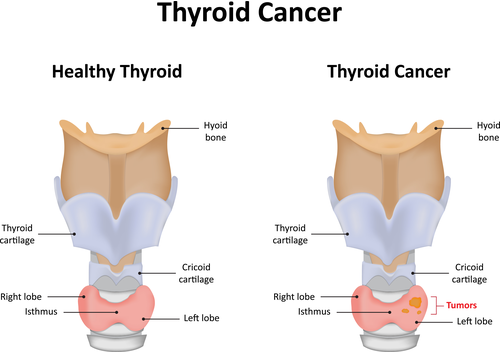Cancer is a word no one ever wants to hear, but with the right knowledge and the right doctor, even the hardest battles can be fought with strength. One such area of concern is Thyroid & Endocrine cancers, which are becoming more common around the world. Although they can sound frightening, modern medicine — surgery in particular — has provided hope to thousands of patients.
In this blog, Dr. Nitin Singhal, a highly skilled Robotic & HIPEC Surgeon, explains everything you need to know about Thyroid & Endocrine Cancer Surgery — from causes and symptoms to treatment options, recovery, and life after surgery. The objective is straightforward: to assist you in knowing that cancer is curable, and when caught early, survival rates are through the roof.

Your thyroid is a butterfly-shaped gland in the front of your neck. It creates hormones which regulate metabolism, heart rate, and energy in the body. The endocrine system, in contrast, consists of glands that secrete hormones to regulate bodily processes such as growth, mood and reproduction.
When weird cells spawn in these glands at an uncontrollable rate, it’s thyroid cancer or endocrine tumors. Thyroid cancer is among the most treatable cancers, but some endocrine cancers can be more complicated and need specialized care.
Most thyroid and endocrine cancers begin because of genetic mutations in the cells. Some known risk factors include:
Though lifestyle is less significant here than in other cancers, routine screenings and early detection save lives.
If caught early, thyroid and endocrine cancers can be much easier to treat. Dr. Nitin Singhal says here are some warning signs you can’t ignore:
If any of these symptoms persist see an oncologist right away for diagnosis.
Diagnosis typically includes a battery of tests to verify the existence and stage of cancer. These include:
Dr. Nitin Singhal thinks that makes early diagnosis a huge survival factor, so regular screening is important for at-risk patients.
Surgery offers the best chance of treatment for thyroid and many endocrine cancers. Depending on the situation, it can consist of:
Robotic Surgery, offered by experts such as Dr. Nitin Singhal, enables minimally invasive operations with quicker recovery and reduced complications.
After thyroidectomy to eliminate residual cancer cells.
Patients might require thyroid hormone replacement for life post-surgery.
External beam radiation might be necessary for more aggressive cancers.
For advanced or recurrent disease, novel therapies such as targeted agents and immunotherapy are demonstrating promising outcomes.
Dr. Nitin Singhal specializes in robotic cancer surgery, making these benefits available to his patients.
Recovery depends on the type of surgery and overall health of the patient. Most people resume normal activities within weeks.
Key aspects of recovery include:
Many patients lead completely normal, healthy lives after treatment, with very high survival rates for thyroid cancer.
Dr. Nitin Singhal is known for his compassionate care and his commitment to giving patients the best chance at recovery.
Q1. Is thyroid cancer curable with surgery?
Yes, in most cases thyroid cancer is completely curable with surgery, especially when detected early.
Q2. What is the recovery time after thyroid surgery?
Most patients return to normal activities within 2–3 weeks. Robotic surgery often reduces recovery time further.
Q3. Will I need lifelong medication after thyroid surgery?
If the entire thyroid is removed, patients will need thyroid hormone replacement tablets for life.
Q4. Can endocrine tumors spread to other parts of the body?
Yes, some endocrine tumors can spread. Regular monitoring and early surgery reduce this risk significantly.
Q5. Why choose Dr. Nitin Singhal for Thyroid & Endocrine Cancer Surgery?
Dr. Nitin Singhal is an expert in robotic and cancer surgeries, offering advanced techniques, faster recovery, and personalized patient care.
Thyroid and Endocrine Cancer Surgery can sound overwhelming, but with expert guidance, advanced technology, and early detection, patients have a very high chance of recovery. Doctors like Dr. Nitin Singhal bring not just surgical skill, but also hope and reassurance for patients and families facing this journey.
If you or a loved one notices suspicious symptoms, don’t delay. Early action can save lives.
